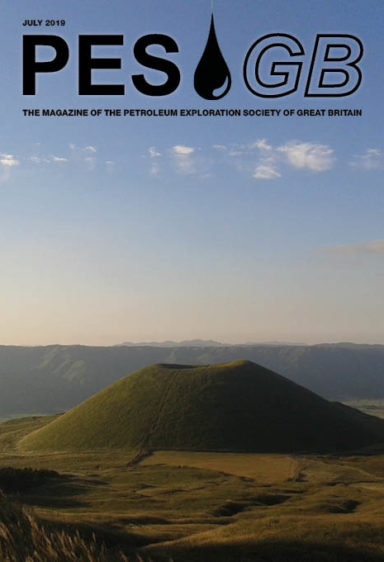PESGB July 2019
Plus much more inside
Towards a low carbon future…
 Last September I was lucky enough to attend a one day conference convened by the Petroleum Group of the Geological Society on the subject of Communicating Geoscience: Building Public Interest and Promoting Inclusive Dialogue. The conference delegates included representation from academia and industry. Given the theme of the meeting, there were discussions and presentations that focussed on ‘getting the story’ across, be it the case for continued oil and gas exploration, or the contentious sentiments attached to fracking operations in unconventional shale and tight gas exploration.
Last September I was lucky enough to attend a one day conference convened by the Petroleum Group of the Geological Society on the subject of Communicating Geoscience: Building Public Interest and Promoting Inclusive Dialogue. The conference delegates included representation from academia and industry. Given the theme of the meeting, there were discussions and presentations that focussed on ‘getting the story’ across, be it the case for continued oil and gas exploration, or the contentious sentiments attached to fracking operations in unconventional shale and tight gas exploration.
The conference benefited from having a number of student delegates, some of whom I managed to talk to during the session breaks. It was during these breaks that I realised for the first time that the ethos and values of the geoscience community has changed significantly over the last ten years or so. When I entered the industry as a graduate (more years ago than I care to remember!), I could not believe my luck that one could pursue a career in earth sciences, where international travel was a necessary part of the job and that the job carried a certain cachet of which many of my university peers were envious. Over time, I have come to recognise and appreciate that geoscientists working within the E&P industry also benefit from working alongside other functional disciplines that range from engineering, environmental planning, through to commercial, legal and financial experts.
Fast forward from the Baby Boomers and Generation X through to the geoscience community that make up the Millennials and Generation Z cohorts. These young geoscientists who are considering a career in our industry are more conflicted than those of us who have enthusiastically embraced the opportunities that working in oil and gas delivers. As a father of three daughters who belong to Generation Z, I am constantly reminded of the arguments being made in support of the need to address Climate Change, Diversity and Sustainability. During one of the conference session breaks I met a young PhD student whose research was funded by an oil company. Through further conversation with him, he shared his enthusiasm and passion for the research that he was undertaking. However, it was interesting to observe his reservations with regard to pursuing a career within E&P. I suspect that he is not alone in these sentiments and that many of his peers may feel conflicted when balancing their personal views against those of companies that are operationally active in oil and gas.
It is interesting to note that the major oil companies are very publicly committed to accelerating the transition to a lower–carbon and cleaner energy system which is consistent with the climate change goals of the Paris Agreement. These companies recognise that in order to meet these objectives a change in mind-set and culture are required in order to catalyse the necessary changes. These include the adoption of ambitious new technologies and skill sets, such as those needed for Carbon Capture and Storage. The Millennial and Generation Z cohorts of the geoscience community are well positioned to continue and implement the industry’s strategy and ambitions for energy transition over the forthcoming decades to come.
I am hopeful that the young geoscientists of today will embrace the oil and gas industry in the knowledge of their pivotal role in delivering a low carbon industry for today’s and tomorrow’s society.
The challenges facing them are just as exciting and rewarding as those enjoyed by the Baby Boomers of my generation and I wish them well.


